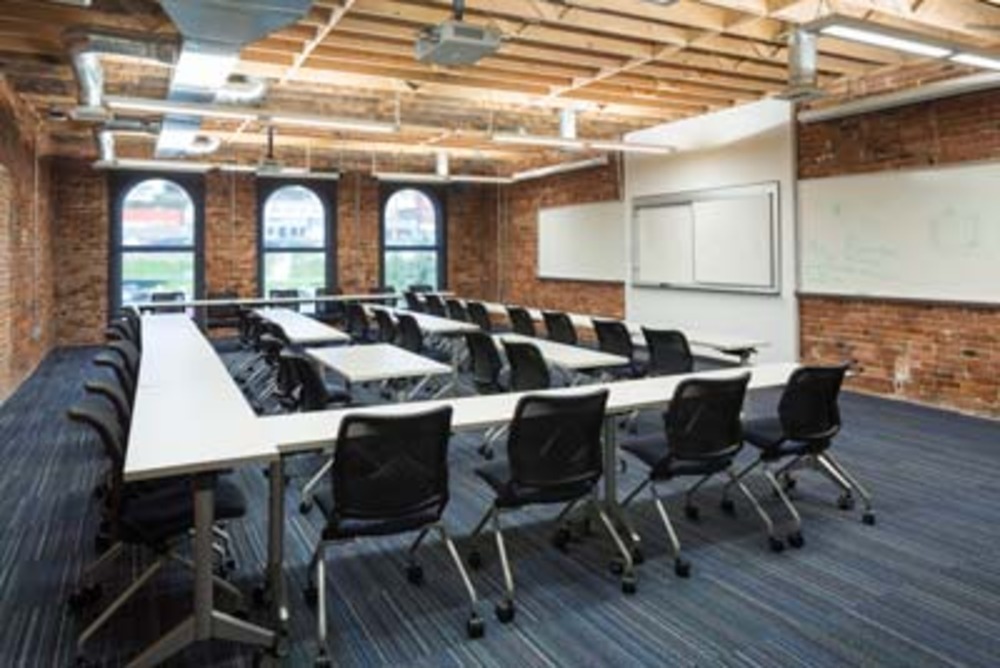Preserving The Window On History - 120-Year-Old McDonald-Smith Building's Arched-top Historical Windows
A university building is renovated with special attention paid to its arched-top historical windows. The 120-year-old McDonald-Smith building, located in the Union Station Historic District on the campus of the Univ. of Washington-Tacoma (UW Tacoma), underwent reconstruction and renovation and opened for the 2015-16 academic year. The renovation included Mission Glass, Tumwater, WA, installing more than 116 of Wausau Window and Wall Systems’ (Wausau, WI) 4250i-XLT INvent Retro series simulated double-hung, arched top, fixed windows.
Author:George EvansOct 13, 202267.1K Shares1.1M Views

A university building is renovated with special attention paid to its arched-top historical windows.
The 120-year-old McDonald-Smith building, located in the Union Station Historic District on the campus of the Univ. of Washington-Tacoma (UW Tacoma), underwent reconstruction and renovation and opened for the 2015-16 academic year. The renovation included Mission Glass, Tumwater, WA, installing more than 116 of Wausau Window and Wall Systems’ (Wausau, WI) 4250i-XLT INvent Retro series simulated double-hung, arched top, fixed windows.
Established in 1990, UW Tacoma provides an 18:1 faculty-student ratio for an enrollment of 4,629 students. The 46-acre campus consists of 21 buildings with a total of 627,664 sq. ft. of active space. Much of the space is nestled in converted landmark structures built in the late 1880s through the early 1930s at the western terminus for the transcontinental railroad system. Today, many of these structures are overseen by the Tacoma Landmarks Preservation Commission to ensure renovations meet the Secretary of the Interior’s Standards and Guidelines for Rehabilitation of Historic Buildings.
The historic, four-story McDonald-Smith building was erected in 1892 for E.A. McDonald and F.C. Smith who were in the wholesale hay, grain, and feed business that flourished along Pacific Avenue at the end of the 19th and early 20th centuries. Like several of its neighbors in Tacoma’s Union Station Historic District, the Younglove Grocery Co. later acquired the building for its operations. Most recently, the building had been converted into mixed-use artists’ housing and retail spaces.
In 2006, UW Tacoma purchased the McDonald-Smith property. In 2014, it was one of two remaining landmark buildings on the campus awaiting renovation. As part of an $11-million renovation project, the university modified the existing historic building for additional office and meeting spaces to support the continued campus growth. Connection to the adjacent, renovated Cherry Parkes building integrates the space within the Tacoma campus.
Planning and design for the project started in 2014, led by Bassetti Architects, Seattle, and guided by the campus’ master plan. Along with the window replacement, the building renovation includes a new mechanical and electrical system, code-required structural upgrades, a new roof, structural openings to tie the building into the neighboring Cherry Parkes building, and a renovation of approximately 30,000 sq. ft. on floors one through three with faculty offices and seminar space.
Bassetti’s associate principal, Jordan Kiel, AIA, LEED AP, explained, “The single-pane wood windows were original to the building and were in poor shape, especially on the west side of the building. As the building owner, UW Tacoma wanted something with more modern performance that met the historic requirements, but wasn’t an operable window. The Landmarks Commission was particularly concerned that the profiles of the new window frames matched the historic windows as closely as possible.”
Landmark Status
The Landmarks Preservation Commission uses the Union Station Design Guidelines to evaluate the appropriateness of proposed alterations. To meet the guidelines and address the commission’s concerns, several options were researched. Bassetti; general contractor M. A. Mortenson, Kirkland, WA; and UW Tacoma’s Milt Tremblay, director of physical planning and sustainability, and Jeannie Natta, project manager of major capital projects, presented their recommendations to the commission.
Natta said, “This was the first project using extruded-aluminum framed windows that had been approved by the commission. In past campus renovations of similar heritage buildings, UW Tacoma used an aluminum-clad wood window. In this case, given the unique arch of the McDonald-Smith windows and that 17 different custom arched window openings exist on the building, the team was challenged to find the best product to use. We pursued approval to use the Wausau aluminum window for the advantages identified.”
Those advantages included: “superior craftsmanship, similar sightlines, closer brickmold profiles,” and “fewer long-term warranty issues.” Natta emphasized that the “continuous clean edge” of Wausau’s extruded-aluminum windows was especially appealing in matching the historic look.
Kiel continued, “Wausau’s simulated double-hung fixed windows were able to meet all of these needs and match the arched openings. They have offset glass planes to give the appearance of historic double-hungs. You wouldn’t know it without studying the building, but each of those arched tops is slightly different, including some very complex curved radius designs. Wausau rose to the occasion.”
Jeff Nickel, Mission Glass’ president, agreed and added, “I am highly impressed with Wausau’s historical windows. Wausau’s ability to take a .dwg file of the shop drawings and fabricate from those was incredibly valuable considering the custom radiuses on the project. Their product is first rate, and so was the service. Their product was fantastic in terms of quality and lead time.”
Wausau’s product-pricing specialist, Kyle Wilkowski said, “If it wasn’t for the help of Mission Glass and Mortenson Construction, we would have not had this great opportunity to display a beautiful product that can present a pleasing historical look inside and outside of the building. The cove profile and black color finish also played a factor in creating the historical look. When we can do windows in these larger sizes, correct profiles, and use a finish from Linetec [Wausau, WI] to keep the look, it will impress many along the way.”
Nickel added, “Wausau had a variety of trims and moldings to match existing conditions and its insulated thermal products offer significant savings in all areas.”
To fabricate the windows’ arched tops, Linetec handled the stretch forming to curve the 4 7/8-in.-deep aluminum frames. It painted the frames and trim in a Black Panther color. Using a two-coat, 70% PVDF resin-based coating, Linetec helped extend the window-systems’ lifespan and reduce maintenance costs. It also provided the extra-wide polyamide thermal barriers. Combined with high-performing glass, this helps Wausau’s INvent windows achieve NFRC U-Factors as low as 0.35 BTU/hr-sqft-ºF with Frame Condensation Resistance Factor (CRFf) of 61 and higher.
Wausau’s INvent Retro series windows are AAMA AW-100 Architectural Performance Class rated. These products are tested to meet or exceed AAMA 910-10 lifecycle testing to 4,000 operating cycles and stringent requirements for air infiltration, water resistance, life cycle testing, and structural integrity. They also offer acoustic performance with Sound Transmission Class (SC) ratings of 31 to 42, further improving the university students’ interior comfort and concentration.
Part of the Advantage by Wausau standard product offering, INvent series windows are competitively priced and available on an accelerated delivery schedule to meet schools’ value-focused budgets and condensed construction schedules. All of Wausau’s INvent windows are backed with a warranty of as much as 10 yr.
Reconstruction of the McDonald-Smith building at UW Tacoma follows a master plan established for campus in 1997. It has earned nationwide recognition for architectural excellence and historic preservation. The campus received the 1999 Honor Award for Regional and Urban Design from the American Institute of Architects (AIA), Washington, and an award from the National Trust for Historic Preservation, Washington.
Jump to

George Evans
Author
George Anderson, an exceptional architectural designer, envisions and brings to life structures that transcend the realm of imagination. With an unwavering passion for design and an innate eye for detail, George seamlessly blends form and function, creating immersive spaces that inspire awe.
Driven by a deep appreciation for the interplay of space, light, and materials, George's innovative approach redefines the possibilities of architectural design. His visionary compositions leave an indelible mark, evoking a sense of wonder and transforming the built environment.
George Anderson's transformative designs and unwavering dedication continue to shape the architectural landscape, pushing the boundaries of what is possible and inspiring generations to come.
Latest Articles
Popular Articles